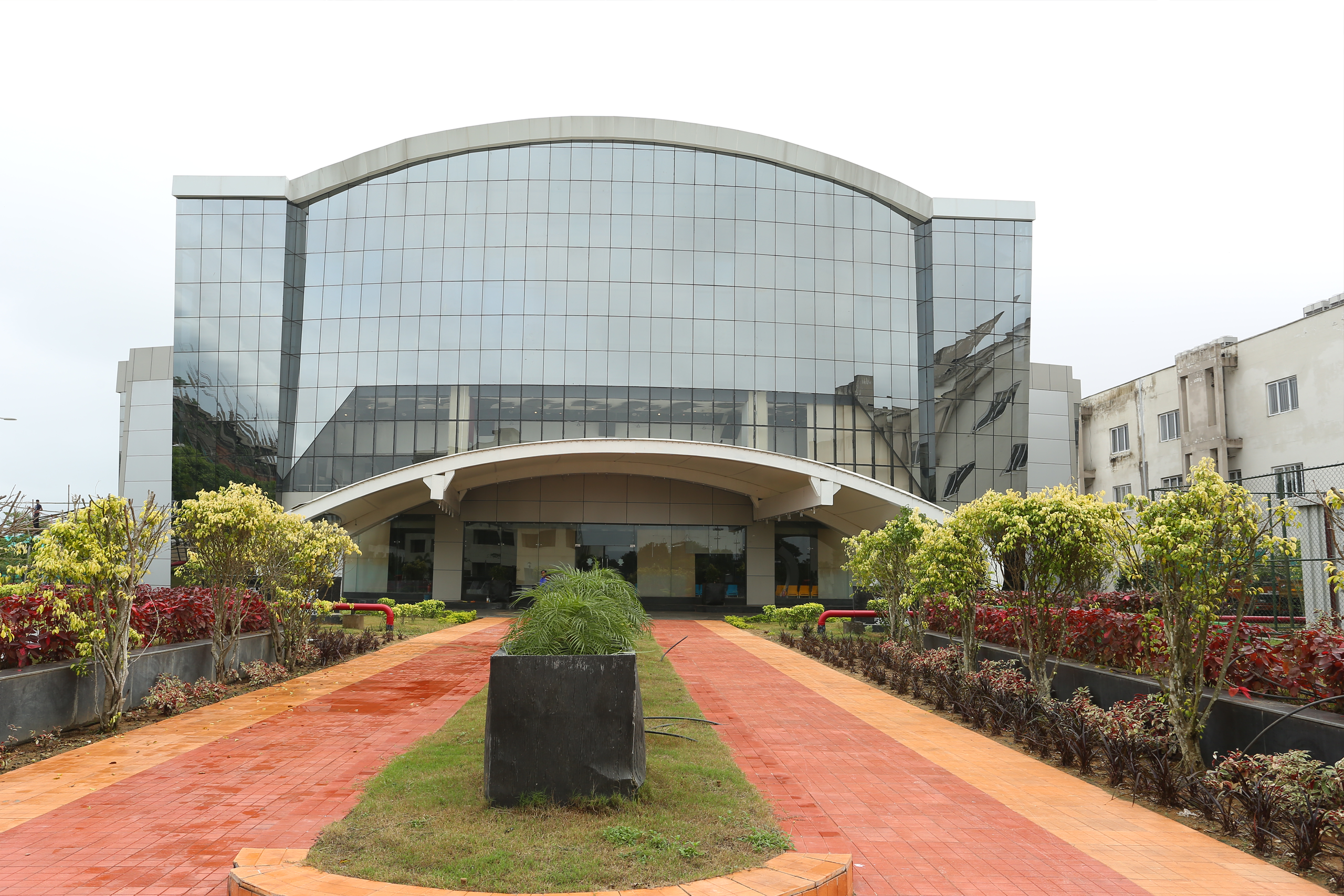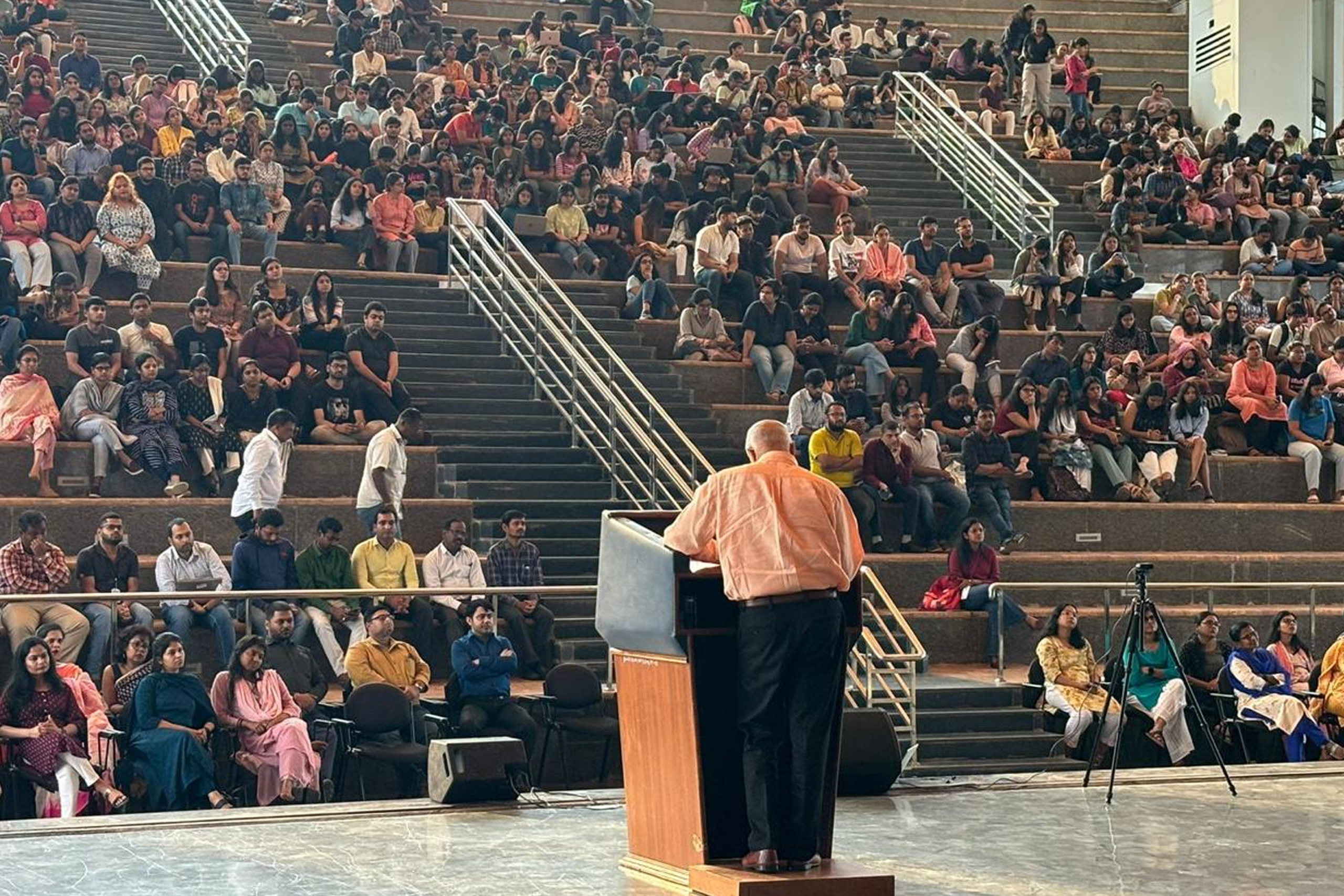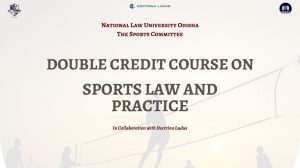News Category: News
Double Credit Course on Sports Law and Practice, in collaboration with Doctrina Ludus by Sport Committee of National Law University Odisha.
07 Nov 2025
About the course
The Double Credit Course on Sports Law & Practice is designed to equip learners with a practical and conceptual understanding of the legal frameworks governing sports at national and international levels. It delves into the intricate relationship between law, governance, and the sporting industry, offering insights into contracts, dispute resolution, anti-doping regulations, athlete rights, and the commercial aspects of sports. Through a blend of theory, case studies, and real-world applications, participants will develop the legal acumen required to navigate the fast-evolving sports ecosystem. The course is in collaboration with Doctrina Ludus.
About Doctrina Ludus
Doctrina Ludus is a movement aimed at promoting sports and sports law education. By recognizing the immense significance of sports in society and the legal framework governing it, Doctrina Ludus strives to bridge the gap between sports enthusiasts, legal professionals, and aspiring students through comprehensive educational programs and engaging activities. This ground-breaking initiative serves as a catalyst for fostering a deeper understanding of the multifaceted world of sports and its legal complexities.
About Resource Persons
- Mr. Tarun, Assistant Professor (Research), GNLU & Co-Founder, Doctrina Ludus
- Mr. Shubham Jain, Researcher, Centre for Sports & Human Rights (CSHR), United Kingdom
- Mr. Deep Ray, Managing Partner, Sensato Legal & Co-Founder, Doctrina Ludus
- Mr. Tarsh Khanna, Partner, Sensato Legal
- Mr. Saksham Samarth, Senior Associate, Uno|One Legal Partners, Spain
- Ms. Hetvi Trivedi, Independent Consultant (IPR) & Former Consultant, World Intellectual Property Organisation (WIPO)
- Dr. Niyati Pandey, Assistant Professor of Law & Head, GNLU Centre for Sports and Entertainment Law (GCSEL), GNLU
- Mr. Nachiket Yagnik, Managing Associate, Krida Legal.
Overview of the course
- Dates– 22nd November – 18th Classes will be conducted on weekends only.
- Number of Hours– 32 Hours (30 Teaching + 2 Evaluation)
- Method of Instruction– Online through Zoom.
- Attendance– Minimum 75% to be eligible for evaluation. Attendance shall be recorded after the completion of each session.
- Last Date of Registration– 19th November 2025, 11:59 PM
- Mode of Assessment – 100 marks MCQs will be conducted at the end of the course. The mode of assessment shall be online.
Payment & Registration
Fees
- 1499/- for Students enrolled in any University.
- 2499/- for Professionals.
Procedure
- Visit https://eazypay.icicibank.com
- Enter Institution Name as ‘National Law University’ and click on ‘Go’
- Fill the details – Email id, Mobile No., Amount, Student Name (Enter your name), Roll or Enrolment No. (Enter your Roll / Enrolment number for NLUO student and enter 131 for others), Semester (Enter your Semester number for NLUO student and enter 11 for others), Year and Payment Date.
- Purpose – “Double Credit Course on Sports Law and Practice” or “Course on Sports Law & Practice”
- Once required data is filled in click on ‘Submit’ after enter the captcha and OTP.
- After the payment you will get the auto generated payment receipt.
- Fill the google form attached to confirm your registration – https://forms.gle/weSWP2axEfKaVaHo8
For more details on the course please refer to the attached brochure or contact us at sports@nluo.ac.in or any of the undersigned.
Brochure
Vansh Kanchan (Convenor)- +91 6393271940
Parikshit Panigrahi (Co-Convenor)- +91 7853971547
SINGLE CREDIT COURSE | ‘RESTORATIVE PRACTICE AND JUSTICE: THEORY AND TOOLS FOR BUILDING COMPASSIONATE COMMUNITIES’ | NOVEMBER 15 to 30, 2025
03 Nov 2025
The present single credit course is a skill-based course designed to provide participants with a comprehensive understanding of Restorative Justice and Restorative Practices (RP). It blends theoretical concepts with practical applications, enabling participants to learn by engaging in interactive modules, discussions, and experiential activities such as restorative circles, storytelling, and nonviolent communication exercises.
This course aims to help participants explore how restorative approaches can transform conflicts, promote healing, and build compassionate communities. It focuses on understanding harms and needs, fostering accountability, and enhancing empathy in various settings such as schools, families, and workplaces. The course outline is divided into four modules covering the fundamentals of restorative practices, self-care and community care, restorative justice in contrast to the criminal justice system, and applications of restorative principles in real-life contexts.
Through role-plays, simulations, and reflection-based activities, the participants will develop essential facilitation, communication, and conflict transformation skills. By the end of the course, participants will be equipped to integrate restorative principles in their professional and personal lives, contributing to more empathetic and inclusive environments.
Course offered by: NLUO Centre for Mediation and Negotiation in collaboration with Accords International
Open for:
- Students from any discipline (UG and PG level)
- Academicians
- Advocates
- Social Workers
- Community Leaders
- Any other ADR and RJ Enthusiasts
Mode: Online (via Google Meet/ Zoom)
Dates: Every Saturday and Sunday between 15 November and 30 November, 2025, from 07:00 PM to approximately 10:30 PM.
Course Fee:
- For participants outside NLUO: ₹1,400/- (Rupees One Thousand Four Hundred Only)
- For participants from NLUO: ₹1,100/- (Rupees One Thousand One Hundred Only)
- For Professionals: ₹ 1600 (Rupees One Thousand Six Hundred Only)
Maximum number of participants: 45 (forty-five)
Note: Since the course is limited to 45 participants, registration shall close automatically after the 45th registration.
Registration ends: 12th November, 2025
For Information Brochure, Information Bulletin and Payment Guidelines:
Brochure
Bulletin
Payment Guidelines
Registration Link:
Justice Savitri Ratho unveils the first internationally indexed issue of NLUO’s Journal on the Rights of the Child
23 Oct 2025
Cuttack, 18 October 2025 — The Centre for Child Rights (CCR) at National Law University Odisha (NLUO) released the latest issue of its flagship publication, the Journal on the Rights of the Child earlier in the week on the 15th October 2025. The journal was unveiled by Hon’ble Justice Savitri Ratho, Chairperson of the Juvenile Justice Committee (JJC) of the Hon’ble Orissa High Court. Marking a significant milestone, this is the first ever edition of the journal to be internationally indexed and assigned an e-ISSN number 3107-4030, underscoring the CCR and the journal’s commitment to global standards of academic excellence.
Delivering the Presidential address, Hon’ble Justice Ratho emphasized the integral role of academic contributions in building robust child rights frameworks. She opened with quoting JFK quote, “Children are the world’s most valuable resource and its best hope for the future. She shed light on the constitutional provisions on child rights, the series of legislations but also reminded everyone that child rights, child protection and welfare is not just a law and order or judicial issue, it is a shared responsibility and everyone needs to step up. She shared the relaunch of the Orissa HC’s JJC’s digital newsletter Sishu Suraksha and invited everyone to read it too. She concluded with the Nelson Mandale quote, exhorting everyone present to make it their talisman, “There can be no keener revelation of a society’s soul than the way it treats it children.”
The unveiling event was graced by Prof Ved Kumari, Vice Chancellor NLUO cum Patron-in-Chief of the CCR, Prof Enakshi Ganguly, Honorary Professor at NLUO and Executive Director of the Housing and Land Rights Network, Prof Biraj Swain, Chief Minister’s Chair Professor cum Director of CCR and Mr M Vijay Bhaskar, Assistant Professor of Law and Co-Director of CCR, Centre for Tribal Studies & Pro Bono Club along with faculty, staff, and students of NLUO.
Ms. Pooja Marwaha, Chief Executive Officer of Child Rights and You (CRY) and her team member Mr Subhendu Bhattacharjee, Director-Policy, Research, Advocacy and Documentation joined digitally alongwith other colleagues. Among the attendees were NLUO Dean of Research and Internationalization Centre, Prof Sheela Rai, and over 150 students studying the Child Rights course or working in the student committee of CCR.
This first ISSNed edition of the journal has 11 original submissions in the categories of papers, case commentaries, infographics and Conference Proceedings written by practicing academics, researchers, advocates and students covering issues of public finance, education, nutrition, consent, role of social work in rehabilitation and reintegration of children in conflict with law, decriminalizing young love, digital safety of children and advancing child–centred justice. All the articles can be accessed freely from the university website. The journal welcomes submissions year-around and manuscripts can be submitted via email to ccr@nluo.ac.in. This edition of the journal is published with generous support from the CRY, marking their continuous collaboration with CCR-NLUO and reaffirming their shared commitment to advancing child rights through academic discourse.
Prof Biraj Swain while delivering her opening remarks emphasized on the rigorous academic processes including high-level blind peer review, fact-checking, plagirism checking and AI verification that has been followed to ensure the quality and ethical standards of the journal. A multi-member team of Associate Editors—Dr Swagatika Samal, Dr Pradipta Kumar Sarangi, Mr Ankit Kumar Keshri, Dr Rashmi Rakha Baug, Dr Shubhanginee Singh and student editor Ms Madhulika Tripathy—has worked intensely to ensure all the checks and compliances before selecting the final list of the submissions for publication.
The journal has a list of Who’s Who as editorial advisory board consisting Hon’ble Justice Madan B Lokur, Chairperson, United Nations Internal Justice Council & Former Judge of the Supreme Court of India, Hon’ble Justice Gita Mittal, Former Chief Justice of Jammu and Kashmir High Court, Prof. Bernd-Deiter Meier, Director, Criminal Justice Institute, University of Hannover, Germany, Prof. Christopher Birbeck, Professor of Criminology, Salford University, Manchester, UK and Prof. Bhabani P Panda, Director, School of Law, KIIT & Former Vice Chancellor, Maharashtra National Law University.
The Editorial Board is headlined by Prof Ved Kumari who is also the Editor-in-Chief. Other members constitute Prof Biraj Swain, the Editor, Prof Ravinder Barn, Professor of Social Policy and Head of Law and Criminology Department, Royal Holloway, University of London, Dr Frederick de Moll, Professor of Educational Science, Faculty of Education Science, Bielefeld University, Germany, Dr Damanjit Sandhu, Professor and Head, Department of Psychology, Punjabi University Patiala, Dr Asha Bajpai, (Former) Founder Dean and Professor, School of Law, Tata Institute of Social Sciences and Dr Kalpana Purushothaman, Adjunct Faculty, Indian Institute of Psychology and Research Bangalore.
Both the editorial advisory board and editorial board have together ensured that the journal adheres to the highest academic standards and inter-disciplinary lens of child rights.
The journal is committed to expand the remit of child rights beyond juvenile justice and POCSO and welcomes scholars, academics, practitioners, policy makers and members of the judiciary to engage with contemporary issues that impact children’s rights and wellbeing. Emphasizing this, Prof Kumari emphasized the need to bridge gaps between research, policy, and practice to build an inclusive framework that understands and addresses the needs and rights of children.
Prof Ganguly highlighted the strategic advantage of CCR being housed within an university. She noted that this setting provides an ideal environment to generate innovative research outputs, contribute to governmental efforts, influence policy development concerning children, and engage as a knowledge partner with the State and the Hon’ble HC’s Juvenile Justice Committee (JJC).
Ms Marwaha highlighted the urgent need to put child rights at the center of every policy and public conversation. She reiterated that the journal will not only showcase rigorous research but also bring to the forefront lived realities of real children and real people—both of which are essential for driving effective policy, programme and advocacy.
The other core members of CCR contributing the achievements of CCR and the journal are, Ms Akanksha Yadav, Co-Director of CCR, Mr Amulya Kumar Swain, Admin Assistant at CCR and research scholar Mr T S Swaraj. CCR has one of the most vibrant and engaged student committees and the student members constitute Abhinandan, Amit Samal, Sushant, Akshat Prakash, Raginee Panda, Ashwani Rai, Subhadra Satpathy, Tanisha Som, and Prayas Das, headlined by Kashish Rathore and Jyotirmay Choudhary. The student members also curate and create a bi-monthly newsletter which is a global and local scan of key developments in child rights. They also curate and run the social media handles of CCR on LinkedIn and Instagram where they make everyday explainers on UNCRC articles and other rights and provisions of children for everyday people. The 6th edition of the Newsletter for the months of October-November 2025 was also launched at the event by Hon’ble Justice Ratho, the dignitaries, the faculty and student members of CCR.
For more information:
Vijay M Bhaskar, Co-Director, CCR-NLUO and Asst Prof of Law and NLUO, Mob: 9439081767 email: vijaybhaskar@nluo.ac.in
News Articles
International Conference on Role of International Trade in Global Energy Transition
16-17 January 2026
Queering the Law: Looking Beyond Supriyo
23 Sep 2025
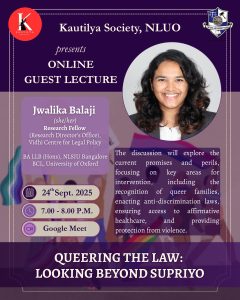
INTRODUCTION
The case of Supriyo v. Union of India is a landmark legal proceeding central to the discourse on equality in India. It is fundamentally concerned with the future of LGBTQIA+ rights within the nation. The case was initiated by members of the queer community who brought a writ petition before the Supreme Court under Article 32 of the Constitution of India, seeking the enforcement of their fundamental rights. They sought not only the legal recognition of marriage for same-sex couples by challenging existing statutes; but also a range of directions to the government and police to protect them from discrimination, harassment, and violence, and to secure benefits associated with unions, such as adoption, financial entitlements, and healthcare decisions. This legal battle represents a critical juncture in the ongoing journey towards securing comprehensive rights and recognition of the LGBTQIA+ community.
AIM OF THE EVENT
The primary aim of the guest lecture, “Queering the law: looking beyond Supriyo,” is to facilitate a nuanced discussion on the future of LGBTQIA+ rights in India following the Supreme Court’s landmark judgment in Supriyo v. Union of India. While the verdict disappointed many, by unanimously holding that there is no fundamental right to marry under the Constitution, and ruling against a right to civil unions via a 3:2 majority, the judgment is not the end of the conversation.
This event seeks to move beyond the headline verdict to critically analyse the significant acknowledgements and directives within the ruling. The lecture will explore the court’s recognition of systemic discrimination against the queer community and the possibility of a entering into a “union,” distinct from marriage. Furthermore, it will delve into the concrete, positive directions issued by the court, such as those for police sensitisation, the creation of safe houses, and a ban on conversion therapy.
A key focus will be the path forward. The discussion will scrutinise the role of the high-powered committee proposed by the government to examine entitlements for queer couples and consider whether this is an adequate substitute for full legal recognition. Ultimately, the event aims to foster a strategic dialogue on the future of this movement, looking towards legislative reform and further advocacy in the wake of the Supriyo decision.
ABOUT OUR GUEST LECTURER
The lecture will be delivered by Ms. Jwalika Balaji, a Research Fellow in the Research Director’s Office at the Vidhi Centre for Legal Policy, Delhi. She holds a Bachelor of Civil Law (LLM-equivalent) degree from the University of Oxford and a BA. LL.B. (Hons) from the National Law School of India University, Bangalore. Her areas of interest include family law, equality and anti-discrimination law, and human rights, with a special emphasis on gender and sexuality. She is on the Board of Directors at OutLawed India, a not-for-profit organisation working to improve access to law and justice. At Vidhi, she has been providing legislative drafting assistance to various Ministries, Departments, and Authorities of the Central Government and various State Governments. She has worked closely on Vidhi’s brief on the subject of the guest lecture and helped in the release of the final consultation papers and chapters, collaborating with the Keshav Suri Foundation.
OVERVIEW OF THE INSTITUTION
National Law University Odisha, Cuttack was established by Act 4 of 2008 by the Odisha State Legislature keeping in mind an enunciated vision of advancement of learning, teaching, research, diffusion of knowledge in the field of law and catering to the needs of society by developing the professional skills of those intending to take up the professions of Advocacy, Judicial Services, Legal services, and so on. National Law University, Odisha is committed to providing an atmosphere in which academic excellence is the foremost priority for students. Along the lines of this vision, NLUO has significantly catered to the needs of the research in various legal fields by paving way for various dedicated research centres and societies.
NLUO CONDUCTS EK PED MAA KE NAAM CAMPAIGN ON 17TH SEPTEMBER, 2025
17 Sep 2025
The NLUO NSS Bureau under the guidance of Dr. Itishree Mishra, Mr. M. Vijay Bhaskar, Ms. Athena Solomon, Ms. Ayushi Srivastava and Mr. Jyotisikha Guha in collaboration with Centre for Research and Management of Natural Resources (CRAMON) Directors Dr. Nikita Pattajoshi and Dr. Divya Singh Rathor on 17th September conducted a plantation drive as part of EK PED MAA KE NAAM campaign.
The Campaign kick started by plantation of tree by Prof. (Dr.) Ved Kumari, VC NLUO and was marked by plantation of saplings of several fruit and flower bearing tress by Faculties, Staffs and students of NLUO.
The Campaign honoured the role and importance of mothers in nurturing life and contributing to the health and wellbeing of the planet by planting trees in the campus.
Two-Day National Workshop on “12 Years of NFSA: Reflecting on Implementation, Exclusion and the Future of Food Rights”
20th September 2025
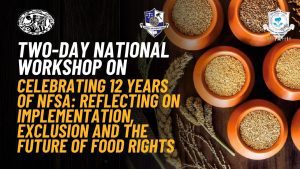
The Centre for Tribal Studies, National Law University Odisha (NLUO), in collaboration with the Jal Shakti Board, NLUO and the Right to Food Campaign, is organising a Two-Day National Workshop on “12 Years of NFSA: Reflecting on Implementation, Exclusion and the Future of Food Rights” on 20th and 21st September 2025 (Saturday and Sunday). The event will be conducted in hybrid mode, with participants joining both at the NLUO campus in Cuttack and online via digital platforms.
The enactment of the National Food Security Act (NFSA), 2013 was a watershed moment in India’s social welfare history. It legally recognised food as an entitlement, extending subsidised food grains to nearly 75% of the rural population and 50% of the urban population. Over the past twelve years, the NFSA has shaped the country’s food security landscape, impacting millions of lives through schemes such as the Public Distribution System (PDS), Integrated Child Development Services (ICDS), Mid-Day Meal Scheme (MDM), and maternity entitlements. Yet, persistent challenges remain – issues of exclusion, digital barriers due to Aadhaar-linked welfare systems, gaps in grievance redress, and inequities in local food systems.
This workshop seeks to critically examine these challenges, reflect on the progress achieved, and chart a path forward. It will feature leading voices from academia, civil society, the legal community, and grassroots activism. Eminent speakers include Dr. Jean Drèze, Harsh Mander, Kavita Srivastava, Dr. Reetika Khera, Dr. Dipa Sinha, Dr. Vandana Prasad, Biraj Patnaik, Anjali Bharadwaj, and several others who have played pivotal roles in shaping the discourse on food rights in India.
The workshop is structured into a series of plenary sessions, panel discussions, community testimonies, film screenings, and open dialogues. The themes to be covered include:
- NFSA at 12: A legal and policy overview.
- Gaps in implementation of core schemes like PDS, ICDS, MDM, and maternity entitlements.
- Digital exclusion in food systems, with a focus on Aadhaar and technology-driven barriers.
- Community testimonies highlighting tribal and disability perspectives on access to food rights.
- Accountability and grievance redress mechanisms under the NFSA.
- Schedule III and WASH-Nutrition convergence– the linkage between food, water, sanitation, and health.
- Food sovereignty versus food security, with a focus on indigenous and sustainable food systems.
- Justiciability of the Right to Food in Courts, exploring the legal enforcement of food rights.
By fostering dialogue between policymakers, lawyers, activists, academics, and students, the workshop aims to create a holistic understanding of food justice in India. It aspires to not only highlight gaps but also collectively imagine a stronger, more accountable, and people-centered implementation of NFSA and related welfare schemes.
The workshop is open to all interested participants, with free registration. However, participants joining online are required to attend all sessions across both days in order to receive their e-certificates. Attendance will be strictly monitored to ensure meaningful engagement.
Event Details:
- Dates:20th–21st September 2025 (Saturday & Sunday)
- Time:From 10:00 AM onwards each day
- Mode:Hybrid (Offline at NLUO Campus, Cuttack & Online via Google Meet/Zoom)
- Registration:Free of cost
- Register here:https://forms.gle/omUae71jnwfrt9qj8
- Certificate Policy:Certificates will only be awarded to participants who attend the entire workshop.
This National Workshop will serve as a meaningful platform for re-imagining India’s food rights regime and strengthening accountability frameworks for the future.
For more information, please contact: cts@nluo.ac.in
218 students were conferred UG, PG, and PhD degrees in the 12th Convocation of National Law University Odisha
13 Sep 2025
The 12th Convocation of National Law University Odisha (NLUO) was held on 13th September 2025 in the Amphitheatre at NLUO’s own campus. The University conferred degrees to 168 graduates of the five-year integrated BA LLB (Hons) and BBA LLB (Hons). 42 post-graduate students were conferred LLM degrees and 3 scholars were awarded PhD degrees. Additionally, 5 BA Law (Hons) students were also conferred degrees. They became the first graduating batch of this one-of-its-kind academic UG Course with a focus on skill building and employability in the legal and ancillary sectors. 14 Gold Medals were also given to the meritorious students.
The Convocation opened with the presentation of the annual report by Prof Ved Kumari, Vice-Chancellor of NLUO, an eminent legal educator with global credentials, capturing the achievements and initiatives of the academic year gone by i.e. 2024-25.
Hon’ble Chief Justice of the Orissa High Court and Chancellor of NLUO, Hon’ble Justice Shri Harish Tandon presided over the proceedings of the function. The Chief Guest for the occasion was Hon’ble Justice Aniruddha Bose, Director of the National Judicial Academy and former Judge of the Supreme Court of India.
Alongside academic accomplishments, the University has continued to strengthen its scholarship initiatives by awarding merit-cum-means scholarships annually to the tune of INR 18,00,000 for meritorious and deserving students from vulnerable income backgrounds. In the efforts to make legal education accessible, this year, 58 students were admitted from the Scheduled Caste, Scheduled Tribe and Persons-with-Disabilities category.
NLUO is truly a pan-India institution with representations from 28 States and Delhi. In addition to the existing 2 UG, 2 PG, and PhD programmes, amongst all the National Law Universities in India, NLUO is the second NLU to offer a 3-year LLB programme. The first batch of this programme will graduate in 2026. NLUO has announced an additional course, that is, the 2-year MBA programme in Healthcare Management and Law to be started from January 2026. The academic year 2024-25 also witnessed NLUO offering 18 certificate courses for students, practitioners and working professionals.
NLUO has been producing capacitated and future-ready legal professionals with a commitment to justice. Sustained efforts of faculties, students and administrative staff in building a culture of academic excellence and a vibrant campus life have led to significant progress in the ranking of the University in the Ministry of Human Resources and Development (MHRD) mandated National Institutional Ranking Framework (NIRF). NLUO’s ranking has substantially risen from 26th position in 2023-24 to 15th in 2024-25 amongst all Law Universities (government, private and trust funded included). It is ranked 6th among the 27 National Law Universities in India.
The graduating 5-year LLB batch of 2025 from NLUO has secured a total of 60 jobs, out of the 80 students who participated in the recruitment process. The recruiters range from top-tier domestic law firms (Saraf and Partners, Shardul Amarchand Mangaldas, Argus Partners etc), banks, private corporations, advisory firms, and Public Sector Undertakings (PSUs). Additionally students have also secured offers from policy think tanks and landed prestigious fellowships like PRS India’s Legislative Assistant to the Member of Parliament (LAMP) Fellowship and the Internet Freedom Foundation’s Freedom Innovation Fellowship.
The University’s 21 Research Centers also undertook some important projects such as conducting training programme for the Railway Police Force, training for 500 officers of the Odisha Police on the Bharatiya Nyaya Sanhita (BNS), Bharatiya Nagrik Suraksha Sanhita and Bharatiya Sakshya Adhiniyam. International Conferences on Finance, Economics, Banking and Insolvency Laws, along with a Conference on the role of international trade in Globalization Energy Transition were also organised. NLUO also conducted an official satellite event on “Advancing Children’s Access to Justice”, as part of the 5th World Congress on Children’s Access to Justice held in Madrid, Spain.
Project Kutumb, the flagship outreach initiative of NLUO launched the first urban area community-level child welfare and protection committees (CLCWPC) in Cuttack in the presence of the VC, District Child Protection Officer (DCPO) and Cuttack Mayor. Centre for Child Rights (CCR) also re-launched its academic journal i.e. Journal on the Rights of the Child of National Law University Odisha, which got internationally indexed and currently boasts of a globally credentialed Editorial Board and Editorial Advisory Board.
NLUO’s mooting also earned laurels with students being finalists in the globally prestigious Oxford Price Media Law Moot, winners of Dastur National Tax Moot and Semi-Finalists of Surana and Surana National Corporate Moot. NLUO also conducted India’s only annual maritime moot i.e. International Maritime Arbitration Moot (IMAM) and introduced a new Moot Court Competition on Health Care.
NLUO also hosted the first legal services fest and successfully organised the 7th Bioscope Global Film Festival which featured various short films, documentaries, feature films, music videos and masterclass by actors, directors, script-writers etc.
NLUO also offered a unique six-credit course which included a play as the evaluation criterion. It was a “Theatre workshop on Legal issues” curated by Internal Quality Assurance Cell (IQAC). It culminated with a play titled Mitti, which was a social commentary on identity, justice and dignity, conceptualized and staged by NLUO students.
The university also conducted a staff versus student cricket match which was more about team building and camaraderie than winning and losing. Continuing in the same spirit NLUO conducted its first “team building, management, leadership skills building” training programme for members of the faculty and staff.
The VC left the graduating students a life advise and reminding them of the core of legal education, “Days like convocation are like a bridge as one foot remains fixed in the past and one goes into the future. I say this to remind you that law becomes the anchor when storms gather. The law is the foundation holding democracy stable. Lawyers, judges, teachers and scholars must hold on to that anchor and it is you who has to do this. Uphold and promote the vision of NLUO with your empathy to the marginalized. professionalism in your workplace and integrity and sincerity in your personal and professional life.”
Synchronizing Democracy Through One Nation One Election: Reform for Efficiency or Engineered Consensus?”
12th September 2025
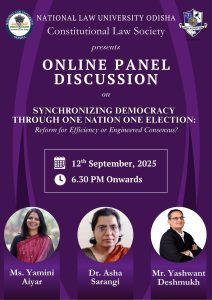
INTRODUCTION:
The One Nation, One Election Bill (ONOE), formally introduced as the 129th Constitutional Amendment Bill, 2024, represents a watershed moment in India’s electoral history. It seeks to synchronise the elections to the Lok Sabha and State Legislative Assemblies, thereby reviving a practice followed in the early years from 1951 to 1967. The initiative, endorsed by a High-Level Committee chaired by former President Ram Nath Kovind, is projected by the government to enhance administrative efficiency, reduce fiscal and environmental costs, and minimise governance disruptions caused by frequent elections. It is also expected to foster a unified national vision by aligning the country’s democratic cycles.
AIM OF THE EVENT:
The proposal has generated intense debate within legal, political, and academic circles. Former Chief Justices D.Y. Chandrachud and J.S. Khehar have affirmed its constitutional viability but has also emphasised the necessity of safeguards to prevent the concentration of “unbridled powers” in the Election Commission. While advocates highlight its potential to save billions of rupees, administrative resources, and promote stable policy cycles, critics caution that such a sweeping change may dilute regional representation, centralised political authority, and overshadow local governance issues, thereby altering the balance of India’s federal structure.
Against this backdrop, the Constitutional Law Society, NLUO, is organising a panel discussion on the theme “Synchronizing Democracy Through One Nation One Election: Reform for Efficiency or Engineered Consensus?”. The session aims to bring together eminent jurists, policymakers, and scholars to critically examine the constitutional underpinnings, logistical feasibility, and democratic safeguards surrounding ONOE. The discussion will not only consider the reform’s efficiency claims but also its potential impact on political pluralism and the voter’s democratic experience. By engaging with both the promises and perils of this electoral restructuring, the panel aims to contribute to an informed and balanced discourse on one of the most consequential constitutional reforms of our time.
ABOUT OUR PANELISTS:
Ms. Yamini Aiyar is currently a Senior Visiting Fellow, Saxena Center for Contemporary South Asia and Watson Institute, Brown University. She was the President and Chief Executive of the Centre for Policy Research, a leading multidisciplinary think tank in New Delhi from 2017-2024. Ms Aiyar’s work sits at the intersection of research and policy practice. During her tenure she spearheaded the establishment of two important new research initiatives within CPR on State capacity and Politics. Prior to becoming President, she set up the Accountability Initiative at CPR known for its work on governance, social accountability and expenditure tracking in social Policy. Her research interests span the fields of contemporary politics, state capacity, welfare policy, federalism and India’s political economy. She is also a part of a number of boards and advisory committees of research centers and non-profits such as Advisory Committee, Weatherhead Center for International Affairs, Harvard University, Member, United Nations Committee of the Experts on Public Administration and Member, Chief Minister’s Rajasthan Economic Transformation Advisory Council (2022-2023) to name a few. She has been widely published across national and international journals and is a regular columnist in the Hindustan Times and Deccan Herald.
Dr Asha Sarangi is a Professor of Political Science at the Centre for Political Studies, School of Social Sciences in Jawaharlal Nehru University, New Delhi. She did her PhD from University of Chicago, USA, where she was awarded the COSAS Fellowship for her work. She is also the recipient of the Social Scientist Award under the Indo-French Cultural Exchange Programme given by the University Grant Commission. Her areas of interest include political and cultural economy of development in modern India, identity and politics in South Asia and more specifically linguistic nationalism in modern India. She has written for several academic journals such as Taylor & Francis, EPW and the India Review. She has also authored several books on language and identity politics in India as well.
Mr Yashwant Deshmukh is a senior Journalist and Psephologist. For more than 25 years he has been inseparable part of Political and Elections coverage in Indian Media and has appeared extensively on almost all the leading News Channels including Aaj Tak, ABP, Times Now, Zee, Republic, India Today, BBC, CNN18, TV9, News24 and number of vernacular networks. He is the founder-director of C-Voter, one of the leading international Public Opinion and Stakeholder research agencies with expertise in working on assignments related to democratization, disaster mitigation and conflict resolution. A first-generation entrepreneur, he has travelled in more than 40 countries working in a number of transitional states and societies across Asia, America, Europe and Africa. Yashwant Deshmukh is an accomplished speaker, mentor, coach and trainer for media and communications students. His regular research workshops are attended by hundreds of students in many International as well as Indian universities.
The Panel Discussion shall take place on 12th September 2025, from 6:30 pm to 8:00 pm. It shall take place virtually and shall witness participation from students all over the nation.
NLUO Secures 15th Rank in the “Law Category” of NIRF 2025 Among 267 Institutions.
05 Sep 2025
The Ministry of Education released the NIRF Rankings 2025 on September 4, 2025. Union Education Minister Dharmendra Pradhan unveiled the 10th edition at a special event at Bharat Mandapam in New Delhi.
National Law University Odisha secured the 15th rank in NIRF 2025 among the top 40 law institutions in India. A total of 267 institutions participated in the NIRF 2025 Law category.
The achievement marks a significant rise for NLUO, which was ranked 26th in NIRF 2024 and 30th in NIRF 2023.

